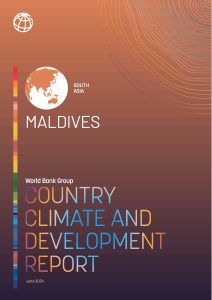The Maldives’ economy relies heavily on tourism and fisheries, two sectors that comprise nearly half of the nation’s GDP and employment. These crucial industries are facing severe risks due to climate change, according to a new World Bank Group report released today.
 The Maldives Country Climate and Development Report (CCDR) finds significant threats to the country’s natural capital, especially to its marine ecosystems, and warns that the impacts on coral reefs and fisheries, already visible, will worsen sharply by mid-century under both high and moderate emission scenarios. This degradation could have devastating effects on the Maldives’ economy and environment. To address these risks, the CCDR outlines critical pathways for climate adaptation, including necessary fiscal reforms to safeguard these sectors and ensure overall economic stability.
The Maldives Country Climate and Development Report (CCDR) finds significant threats to the country’s natural capital, especially to its marine ecosystems, and warns that the impacts on coral reefs and fisheries, already visible, will worsen sharply by mid-century under both high and moderate emission scenarios. This degradation could have devastating effects on the Maldives’ economy and environment. To address these risks, the CCDR outlines critical pathways for climate adaptation, including necessary fiscal reforms to safeguard these sectors and ensure overall economic stability.
Maldives’ coral reefs, essential for beach formation, coastal protection and tourism, are degrading rapidly. The CCDR projects that nearly all coral cover among reefs could disappear if global temperatures rise above 2°C, emphasizing the urgent need for both global emission reductions and stronger local conservation measures.
The report assesses the impacts of sea-level rise, projecting an increase of up to 0.9 meters by 2100. Without effective adaptation strategies, coastal flooding could severely damage up to 3.3 percent of the Maldives’ total assets by 2050 during typical 10-year floods, resulting in damages of US$0.7–1.1 billion of GDP. Strategic investments in adaptation could cut almost in half the projected GDP impact of sea-level rise—from a reduction of 11 percentage points under a high-emission scenario to less than 6 percentage points with sustained reconstruction and adaptation investments.